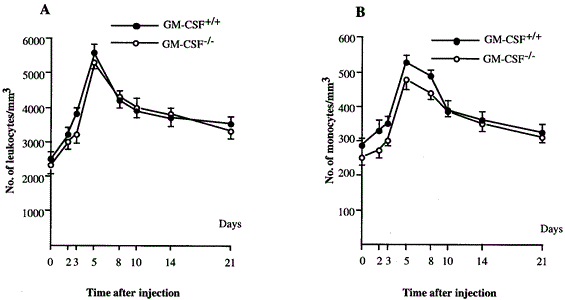Role of granulocyte/macrophage colony-stimulating factor in zymocel-induced hepatic granuloma formation |
| |
| Authors: | Wynn A A Miyakawa K Miyata E Dranoff G Takeya M Takahashi K |
| |
| Affiliation: | Second Department of Pathology, Kumamoto University School of Medicine, Kumamoto, Japan. |
| |
| Abstract: | 
To examine the role of granulocyte/macrophage colony-stimulating factor (GM-CSF) in inflammatory granuloma formation, we injected GM-CSF-deficient (GM-CSF(-/-)) mice and wild-type (GM-CSF(+/+)) mice intravenously with 2 mg of zymocel, and mice were killed at various intervals for examination. In GM-CSF(-/-) mice, we demonstrated a marked delay of zymocel-induced hepatic granuloma formation until 5 days after zymocel injection with a rapid reduction in numbers of granulomas at 10 days until their disappearance. In the early phase of granuloma formation, monocyte infiltration and differentiation of monocytes into macrophages were impaired in GM-CSF(-/-) mice compared with GM-CSF(+/+) mice. The percentages of [(3)H]thymidine-labeled macrophages at 2 days after zymocel injection were lower in the GM-CSF(-/-) mice than in the GM-CSF(+/+) mice. The DNA nick-end-labeling method demonstrated increased numbers of apoptotic cells in and around hepatic granulomas of GM-CSF(-/-) mice from 8 days after zymocel injection, and electron microscopy detected apoptotic bodies. Granuloma macrophage digestion of glucan particles and activation of macrophages were similar in the two types of mice. In situ hybridization demonstrated expression of GM-CSF mRNA in the endothelial cells, hepatocytes, and some granuloma cells in the GM-CSF(+/+) mice but not in the GM-CSF(-/-) mice. These results provide evidence that GM-CSF is important for the influx of monocytes into hepatic granulomas, for differentiation of monocytes into macrophages, and for proliferation and survival of macrophages within hepatic granulomas. |
| |
| Keywords: | |
| 本文献已被 ScienceDirect PubMed 等数据库收录! |
|

